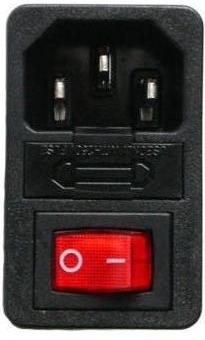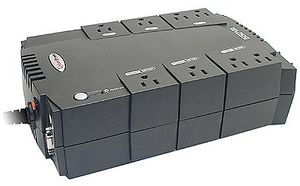Difference between revisions of "Power Options"
(→Power Inlet) |
|||
| Line 15: | Line 15: | ||
A number of vendors carry similar products with several different types of switches. | A number of vendors carry similar products with several different types of switches. | ||
| − | See [ | + | See [http://newwiki.arcadecontrols.com/index.php?title=Wiring#IEC_Fused_Power_Inlet_with_a_Lighted_Switch here] for details. |
<br clear="all"> | <br clear="all"> | ||
Latest revision as of 16:03, 9 December 2014
In building your cabinet, you might forget that a PC is running at the heart of it and you don't want to be opening it up each time to turn it on. Also, you may want your cabinets' components (PC, monitor, speakers, marquee light etc.) to power on and off simultaneously with each other, to add to the illusion of a real arcade machine. Depending on what operating system you are using, simply unplugging the PC may cause problems if the operating system is not given time to properly power down.
There are several options to consider...
Power Inlet
| ---DISCLAIMER--- |
| This Wikipage explains how to modify or connect electric equipment. Build Your Own Arcade Controls Wiki recommends reading the manuals of the tools and equipment you are using.
|
One popular choice for neatly bringing power into a cab is a power inlet with an IEC320 C14 socket.
Some of them have built-in switches and/or fuse holders.
A number of vendors carry similar products with several different types of switches.
See here for details.
'Smart' Power Strips
A popular approach is to use a Smartstrip or similar 'smart switching' power strip. Smartstrips can provide constant power to some components just like a normal power strip, but their most attractive feature is their automatic switching ability.
One component (typically your PC) is plugged into the blue 'Control' outlet. Other cabinet components are plugged into the switched outlets; these components will remain unpowered until your PC (or whatever is plugged into the blue Control outlet) is switched on. This means that all components will power on when your PC is switched on, and more importantly once your PC completes its shutdown procedure the other components will automatically power off. Using your PC's power switch to turn on and off all components of your cabinet in this way is probably the most popular option for PCs running modern operating systems.
Alternatives to the Bits Ltd. Smartstrip include the Mini Power Minder and the PowerMite DD (sold by BYOAC member Whammoed).
Build Your Own 'Smart' Power Strip
A simple relay can be added to most regular power strips to add 'smart' functionality to them, using a USB cable or hard-drive power cable from your PC to trigger the relay. When a voltage is detected from the PC, the relay supplies power to the outlets (see the external links below for more details). Considering the effort required it may be wiser to go for a retail option, but if you're on a tight budget and know what you're doing then a hack like this may be the way to go.
Uninterruptible Power Supplies (UPS's)
Generally regarded as the safest way of doing things, though not necessarily the cheapest, is to use a small Uninterruptible Power Supply (UPS) in your cabinet. UPS's are intended to provide temporary battery backup power if there's a drop-out, as well as protect against power spikes.
Many models include a serial or USB functionality that can safely initiate your computer's shutdown procedure once power has been cut to the cabinet; the computer will run on the UPS's battery power until it has shut down. When used in an arcade cabinet this means that you can just pull the plug on the whole cabinet and the computer will then safely shut down.
Standard Power Strips
Another approach is to use a regular power strip and, again, hacking an extended-wire intermittent switch to where the strip's switch is, and mounting that somewhere on the cabinet. Then, in the computer's bios settings, 'power on after interrupt' or something of that nature is selected. When power is restored, by turning the strip on, the computer senses this and turns on.
This solution is recommended for DOS based PCs that don't require a shutdown procedure such as Windows based PCs. The computers hard drive can also be damaged if the computer is writing information to its hard drive when power is cut.
The Power Switch
Once you've determined the best power solution for your situation, the final step is to mount an on/off switch to an accessible position on your cabinet.
If your cabinets' power is controlled by your computer (as in the Smartstrip solution), you can wire an extended switch from your computer case's power button and mount it somewhere on the surface of the cabinet. The computer could also positioned so that its power switch is accessible through a hole in the side of your cabinet.
The "Cap Trick"
There is a way to turn on an ATX motherboard using a small electrolytic capacitor. Known as The Cap Trick, it relies on the state of an electrolytic capacitor having a shorted state when there is no charge running through it. When you apply a charge, the capacitor has an 'open' state. It's important to use a capacitor with a very small capacitance, so it will open quickly, mimicking a press of the power button.
External Links
Another option is to hack your own power strip using a relay, explained here : http://tinyurl.com/c5drk2z


